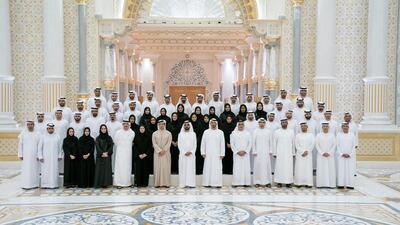The final piece of a UAE-built probe destined for Mars was signed by two of the country’s leaders on Sunday.
At the Presidential Palace in Abu Dhabi, Sheikh Mohammed bin Rashid, Vice President and Ruler of Dubai, and Sheikh Mohamed bin Zayed, Crown Prince of Abu Dhabi and Deputy Supreme Commander of the Armed Forces, wrote an inspirational message for the rest of the Arab world on a piece of the outer casing of the Hope probe.
“The power of hope shortens the distance between the Earth and sky,” the two wrote in Arabic. The metal piece will be attached to the probe before it is launched into space this year to study the atmosphere on Mars.
“Today me and my brother Mohamed bin Zayed signed the last piece of the outer structure of the Hope probe, the first Arab-Islamic probe to reach Mars,” Sheikh Mohammed said on Twitter.
He said the phrase, which will be engraved, “sends a message to all Arab youth that we are able to succeed and compete and not to lose the power of hope that can move mountains”.
In a tweet, Sheikh Mohamed confirmed the probe would launch in July. The launch window was chosen because it is the time that Earth and Mars will be at their closest point. This only happens once every two years.
“Buoyed by the determination of our youth, we are proceeding with our space programme to serve science and humanity,” Sheikh Mohamed said.
On Sunday, Yousuf Al Shaibani, the director general of Mohammed bin Rashid Space Centre, said such landmark moments in the development of the probe gave him a sense of national pride.
“On this day, a new dream is fulfilled on the ground.
“We will renew our efforts to raise the UAE’s name while relying on young Emirati talents to contribute strongly to fulfilling the aspirations of our country’s leadership and to the enrichment of humanity,” said Mr Al Shaibani.
The Hope Probe mission, also called the Emirates Mars Mission, is the first by any Arab or Muslim-majority country. There have been only 26 successful missions to Mars from nine countries.
Built by Emirati engineers with help from US experts, Hope will blast off from Tanegashima Space Centre in Japan. It will take seven to nine months for the probe to reach Mars and will arrive in the same year the UAE celebrates its 50th anniversary since unification.
The probe was designed and developed by a team of 10 from the Mohammed bin Rashid Space Centre but funded and supervised by the UAE Space Agency.
Hope will become one of three probes orbiting Mars. The other two are already in place.
Nasa is studying the upper atmosphere of the Red Planet with one probe, while India analyses the lower atmosphere with another. The UAE probe will study how the upper and lower layers interact with one another, providing the first complete picture of the planet’s atmosphere. It will also help to create a picture of how the seasons on Mars are affected by the light of the Sun.
The spacecraft will collect two years’ worth of scientific data, or 1,000GB, with an optional two-year extension that would take the mission into 2025.
The information will give scientists deeper insight into the past and future of our own planet as well as the potential of life for humans on Mars and on other distant planets.
It is likely that the information gathered during the mission will inform the UAE's plans to build a habitable settlement on Mars by 2117.
The UAE became a formidable contributor to the space sector after launching several locally made satellites into space and, last year, sending the first Emirati astronaut to the International Space Station.
Maj Hazza Al Mansouri spent eight days at the station in September, carrying out scientific experiments and giving a tour of the station in Arabic.
"The UAE is on the verge of making history, after turning its dream of becoming the first Arabic and Islamic country to send a spacecraft to Mars into reality," said Ahmad Al Falasi, Minister of State for Higher Education and Advanced Skills and chairman of the UAE Space Agency, after announcing in April that construction of the probe was 85 per cent complete.
“This monumental endeavour is the culmination of the efforts of a skilled and experienced team of young Emiratis, who with the support of the nation and its visionary leadership will secure the UAE’s position at the forefront of space exploration and the international space sector."





